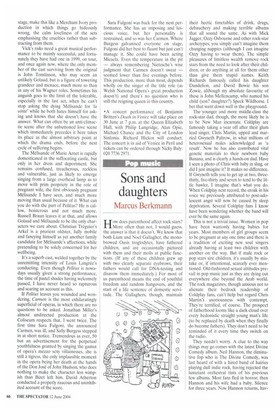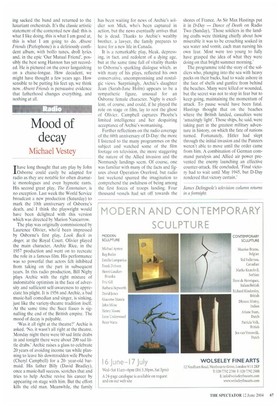Sons and daughters
Marcus Berkmann
How does parenthood affect rock stars? More often than not, I would guess, the answer is that it doesn't. We know that both Liam and Noel Gallagher, the monobrowed Oasis troglodytes, have fathered children, and are occasionally pictured with them and their molls at public functions. (If any of these children grew up with two clearly separate eyebrows, their fathers would call for DNA-testing and disavow them immediately.) For most of us parenthood means the end of youthful freedom and random hangovers, and the start of a life sentence of domestic servitude. The Gallaghers, though, maintain
their hectic timetables of drink, drugs, debauchery and making terrible albums that all sound the same. As with Mick Jagger, Ozzy Osboume and other rock-star archetypes, you simply can't imagine them changing nappies (although I can imagine Ozzy having to wear them). The simple pleasures of limitless wealth remove rock stars from the need to look after their children, or do anything at all for them other than give them stupid names. Keith Richards famously called his daughter Dandelion, and David Bowie his son Zowie, although my absolute favourite of these is John Mellencamp, who named his child (son? daughter?) Speck Wildhorse. I bet that went down well in the playground.
The younger and more middle-class the rock-star dad, though, the more likely he is to be New Man incarnate. Coldplay are famously taking a year off after their glum lead singer, Chris Martin, upped and married Gwyneth Paltrow, in what millions of heterosexual males acknowledged as 'a result'. Now he has also contributed vital genetic materials to their newborn baby Banana, and is clearly a hands-on dad. Have I seen a photo of Chris with baby in sling, or did I just imagine it? It makes no difference. If Gwyneth tells you to get up at two, threethirty, five-thirty and seven to tend to the little bawler, I imagine that's what you do. When Coldplay next record, the croak in his voice we previously attributed to post-adolescent angst will now be caused by sleep deprivation. Several Coldplay fans I know have been wondering whether the band will ever be the same again.
This is not a trivial issue. Women in pop have been wantonly having babies for years. Most members of girl groups seem to be pregnant at any one time and there is a tradition of exciting new soul singers already having at least two children with another on the way. But if male rock or pop stars sire children, it's usually by mistake or, if intentional, scarcely ever mentioned. Old-fashioned sexual attitudes prevail in pop music just as they are dying out everywhere else beyond the Arab world. The rock magazines, though anxious not to alienate their bedrock readership of Coldplay fans, can't help but regard Chris Martin's uxoriousness with contempt. They're terrified, of course. The prospect of fatherhood looms like a dark cloud over every hedonistic straight young man's life (to be replaced by death when they finally do become fathers). They don't need to be reminded of it every time they switch on the radio.
They needn't worry. A clue to the way things may go comes with the latest Divine Comedy album. Neil Hannon, the diminutive fop who is The Divine Comedy, was last heard of with a hired band of hairies playing dull indie rock, having rejected the luxuriant orchestral tints of his previous few albums. Most fans fled in horror; then Hannon and his wife had a baby. Silence for three years. Now Hannon returns, hay
ing sacked the band and returned to the luxuriant orchestrals. It's the classic artistic statement of the contented new dad: this is what I like doing, this is what I am good at, this is what I am going to do. Absent Friends (Parlophone) is a deliriously confident album, with boffo tunes, droll lyrics and, in the epic 'Our Mutual Friend', possibly the best song Hannon has yet recorded, He is pictured on the cover languishing on a chaise-longue. How decadent, we might have thought a few years ago. How sensible to be putting his feet up, we think now. Absent Friends is persuasive evidence that fatherhood changes everything, and nothing at all.



















































































 Previous page
Previous page